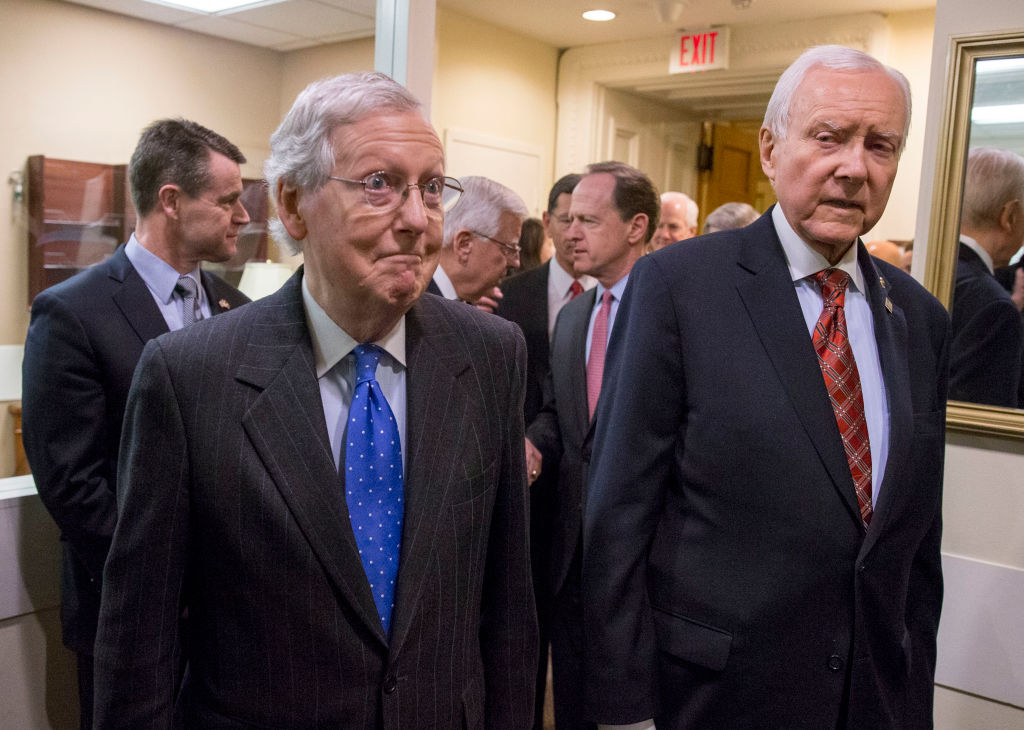The GOP tax bill will actually add $2 trillion to the national debt, Trump's alma mater predicts


A free daily email with the biggest news stories of the day – and the best features from TheWeek.com
You are now subscribed
Your newsletter sign-up was successful
The key moment in the Republican Party's mad dash to passing a sweeping tax bill was when Republicans abandoned revenue neutrality and Sens. Pat Toomey (R-Pa.) and Bob Corker (R-Tenn.) agreed in September that the package could add up to $1.5 trillion to the federal deficit, Senate Majority Leader Mitch McConnell told Bloomberg on Monday. "Without that there would've been no tax bill." Republicans have maintained that the deep tax cuts for businesses would juice the economy enough that the tax bill would pay for itself, but no economic analysis has borne that out.
The Congressional Budget Office projects that the GOP tax bill will add $1.46 trillion to the federal deficit over 10 years, while the official tax analysts at Congress' nonpartisan Joint Committee on Taxation said it will add $1 trillion, accounting for economic growth, as Republicans requested. The right-leaning Tax Foundation estimated Monday that the tax bill will increase the deficit by $448 billion, also factoring in economic growth.
Meanwhile, the tax analysts at the Wharton School at the University of Pennsylvania — where President Trump, as he likes to remind people, got his bachelor's degree in economics — project the bill will add $1.9 trillion to $2.2 trillion in federal debt over the next decade, including growth. That's largely because the Penn Wharton Budget Model projects that the tax bill will increase GDP growth by a modest 0.06 to 0.12 percentage points a year.
The Week
Escape your echo chamber. Get the facts behind the news, plus analysis from multiple perspectives.

Sign up for The Week's Free Newsletters
From our morning news briefing to a weekly Good News Newsletter, get the best of The Week delivered directly to your inbox.
From our morning news briefing to a weekly Good News Newsletter, get the best of The Week delivered directly to your inbox.
To prevent the defection of deficit hawks, "Republicans walled themselves off from criticism, convincing one another that unfavorable economic analyses of their bill were wrong," The New York Times reports. Not every Republican believed the bill would pay for itself — Sens. John McCain (R-Ariz.) and Susan Collins (R-Maine) both met with conservative economist Douglas Holtz-Eakin, who said he told McCain "it's going to have some deficits, no matter what you hear." McCain decided it was worth it. Collins, the Times says, "came away with the impression that the bill would pay for itself."
A free daily email with the biggest news stories of the day – and the best features from TheWeek.com
Peter has worked as a news and culture writer and editor at The Week since the site's launch in 2008. He covers politics, world affairs, religion and cultural currents. His journalism career began as a copy editor at a financial newswire and has included editorial positions at The New York Times Magazine, Facts on File, and Oregon State University.
-
 Switzerland could vote to cap its population
Switzerland could vote to cap its populationUnder the Radar Swiss People’s Party proposes referendum on radical anti-immigration measure to limit residents to 10 million
-
 Political cartoons for February 15
Political cartoons for February 15Cartoons Sunday's political cartoons include political ventriloquism, Europe in the middle, and more
-
 The broken water companies failing England and Wales
The broken water companies failing England and WalesExplainer With rising bills, deteriorating river health and a lack of investment, regulators face an uphill battle to stabilise the industry
-
 TikTok secures deal to remain in US
TikTok secures deal to remain in USSpeed Read ByteDance will form a US version of the popular video-sharing platform
-
 Unemployment rate ticks up amid fall job losses
Unemployment rate ticks up amid fall job lossesSpeed Read Data released by the Commerce Department indicates ‘one of the weakest American labor markets in years’
-
 US mints final penny after 232-year run
US mints final penny after 232-year runSpeed Read Production of the one-cent coin has ended
-
 Warner Bros. explores sale amid Paramount bids
Warner Bros. explores sale amid Paramount bidsSpeed Read The media giant, home to HBO and DC Studios, has received interest from multiple buying parties
-
 Gold tops $4K per ounce, signaling financial unease
Gold tops $4K per ounce, signaling financial uneaseSpeed Read Investors are worried about President Donald Trump’s trade war
-
 Electronic Arts to go private in record $55B deal
Electronic Arts to go private in record $55B dealspeed read The video game giant is behind ‘The Sims’ and ‘Madden NFL’
-
 New York court tosses Trump's $500M fraud fine
New York court tosses Trump's $500M fraud fineSpeed Read A divided appeals court threw out a hefty penalty against President Trump for fraudulently inflating his wealth
-
 Trump said to seek government stake in Intel
Trump said to seek government stake in IntelSpeed Read The president and Intel CEO Lip-Bu Tan reportedly discussed the proposal at a recent meeting
